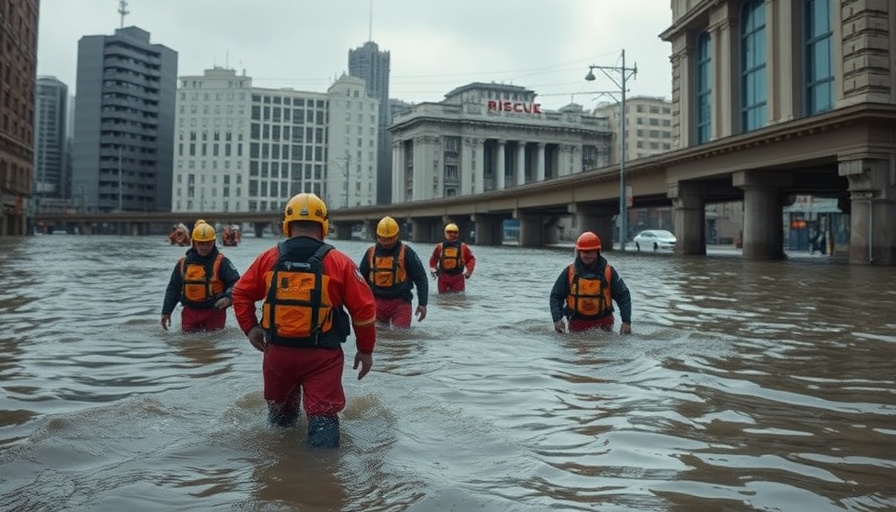
Rising Flood Risks: A Call for Action
As Malaysia faces increasingly severe flood-related disasters, with over 15,000 people displaced in just this year alone, the World Bank has sounded a pivotal warning: the economic costs of inaction on climate change could escalate dramatically. The alarming statistics outline a dissonance between the immediate costs of climate disasters and the long-term economic implications of neglecting climate resilience.
Regions such as Johor, Sarawak, and Sabah have experienced record floods, leading to loss of lives, and significant damage to businesses and households. In Sarawak, a single day of rainfall in February reached an unprecedented 900 millimeters, devastating local communities. With each incident, the financial burden rises; individual traders are incurring an average of RM20,000 (US$4,728) in losses from flooding. Sadly, aid has barely scratched the surface of the problem, as local governments are now realizing the importance of bolstering climate adaptation efforts.
The Economic Case for Climate Action
The 2024 report from the World Bank and Bank Negara Malaysia predicts that, if left unaddressed, flooding could consume around 4.1% of Malaysia’s GDP by 2030, primarily impacting smaller businesses. This startling projection emphasizes the urgent necessity for comprehensive climate planning. “What the report shows is that if you don’t think about climate projections and start to plan to reduce those costs today, you might face massive expenses in the future,” notes Marco Larizza, a senior public sector specialist at the World Bank.
In the wake of rising economic losses—which climbed to RM933.4 million (US$218.3 million) in 2024, from RM755.4 million (US$176.7 million) in 2023—clear strategies must be implemented to integrate climate risks into the national budget. The urgent need for climate-smart financing and investment strategies cannot be understated, particularly to improve adaptive capacity for vulnerable communities.
Adopting Sustainable Solutions for Adaptation
To mitigate future risks, the government must not only respond to current disasters but also actively pursue sustainable living solutions. This means investing in renewable energy sources such as solar power, enhancing green infrastructure, and embracing sustainable practices that promote ecological conservation.
Environmental conservation initiatives, like community gardens and tree planting programs, can enhance local biodiversity while simultaneously reducing carbon footprints. Moreover, by fostering green businesses and eco-friendly products, Malaysia can stimulate economic growth while contributing to climate action.
Future Predictions and Community Resilience
The projection of increased rainfall and its correlation with climate change highlights the need for immediate action. As weather patterns continue to shift, Malaysia’s proactive measures in investment toward climate resilience can serve as both a catalyst for economic growth and an essential shield against natural disasters.
Embracing a circular economy, where resources are reused and waste is minimized, aligns with the global call for sustainable living that prioritizes responsible consumption. By integrating sustainability into core economic strategies, Malaysians may begin to see a significant reduction in vulnerability to climate risks.
Challenges Ahead: Moving Forward
However, the journey towards a sustainable future is fraught with challenges. One major hurdle is the economic dependency on traditional industries that contribute to environmental degradation. Shifting towards a green economy requires strong governance and virile policy initiatives designed to facilitate this transition.
The societal implications are enormous; reducing environmental pollution and raising awareness about climate change effects equip communities with the knowledge to advocate for change. It’s imperative that Malaysians mobilize as a community, from advocating for eco-friendly transportation options to urging businesses to adopt sustainable practices.
Conclusion: The Importance of Sustainable Futures
As we stand on the precipice of a climate crisis, it is clear that the time for action is now. The economic ramifications of failing to address climate change are significant, but by integrating sustainability into our national fabric, Malaysia can navigate toward a resilient future while ensuring economic stability. Inclusive, multi-faceted approaches that involve government, businesses, and communities will be critical in fostering a more sustainable—and economically viable—tomorrow.
 Add Row
Add Row  Add
Add 



Write A Comment